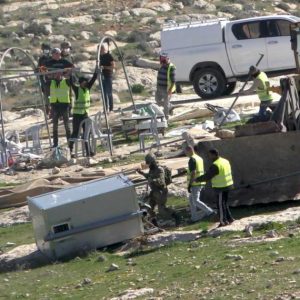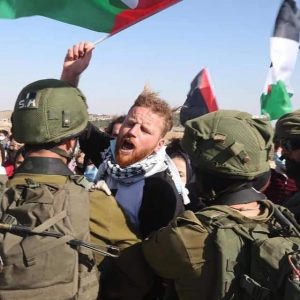The tiny villages of the Masafer Yatta region in the South Hebron Hills are only an hour’s drive from Jerusalem or an hour and a half from Tel Aviv, but traveling here one seems to be going back in time. Here, at the edge of the desert, farmers eek out a meager living growing barley and olives and herding sheep. Their dwellings are often caves supplemented with rudimentary stone structures and there are few water lines or electric connections. Along the bumpy unpaved roads there are no signs to direct you to Jinba, A-Tuba or any other of the dozen or so Palestinian communities. Instead, there are concrete blocks marking off the area as a military training ground, firing zone 918.
Though the Israeli military don’t often train here, declaring the area a firing zone was a way first to restrict building and infrastructure development and later to evict its Palestinian population, and herd them into the densely populated town of Yatta, on the other side of the highway. This policy is not unique to Masafer Yatta; all over the West Bank the Israeli military government is squeezing Palestinians out of sparsely populated areas in the countryside and into the dense cities, clearing space for more Israeli settlements, military infrastructure and eventually, perhaps, official annexation to Israel. Large swaths of land have been declared either military training ground or nature reserves so that living and farming become illegal.

In fact, the unique thing about these communities is not the pressure they are under but the fact that they have refused to buckle under it. In 1999 the military forcefully evicted 12 such communities, some 700 people, loading them on trucks and driving them to the nearby town of Yatta. Bulldozers razed homes and cisterns were filled with earth in order to prevent their return. Still, they did not give up. Appealing to the Israeli High Court they showed that they and their families had resided in the area long before Israel came to rule it. Eventually, they were allowed to return under an interim order, and laboriously began rebuilding what was destroyed.
The military grudgingly allowed the population to return (today those same communities number some 1800 people) but has done much to make their life difficult. At one point they placed miles of concrete barrier along route 317, that separated the villages from their mother town of Yatta. The 2 foot high fence was explained as security, but it’s only real function was to prevent the passage of herds, tractors and other vehicles between the town and the villages.
Meanwhile, new settlement “outposts” were built in the area. Though these Jewish communities have no official permits, somehow, the roads leading to them were paved, and they were soon connected to the water and electric grid. Palestinians in Masafer Yatta now have to contend not only with harassment by the military, but with attacks from settlers, who don’t like shepherds coming anywhere near their outposts and will often attack and drive away herds, as well as poison animals, sabotage water cisterns and sometimes physically attack Palestinians.
The settlement outposts operate in close collaboration with the military. The Israeli army allocates soldiers to guard every outpost and these often accompany settlers in their raids outside the outposts. Usually it is the settlers driving away herds and beating up their owners while the soldiers look on from behind, ready to back them up if they encounter any resistance.
Legal organizations have been formed (notably ‘Regavim’) to support the outposts and appeal the Israeli courts and politicians to hasten the demolition and eviction of nearby Palestinian communities. Though they operate in close collaboration with the state, these organizations are private and are funded mostly with private US donations (from both right wing Jews and evangelical Christians). Remarkably, these organizations enjoy tax exempt status in the US and are considered charities – charities to support the forced eviction of Palestinians and the growth of settler outposts.

Palestinians in the area have received support from both Israeli and international activists, who have assisted in documenting and to some degree mitigating settler violence, as well as with appealing to the Israeli courts and setting up solar panels and wind turbines to provide basic electricity in many of the communities. Still, living conditions are difficult, and improvement is a struggle as the military government will not grant building permits in these communities, and will often come to demolish any newly built homes, animal pens, and even water cisterns.
South Hebron was in the news this year when video circulated widely of a young Palestinian man, Harun Abu Aram, getting shot in the neck as he attempted to stop soldiers confiscating a generator he was using to rebuild his demolished home. 6 months later Abu Aram is still in hospital, paralyzed, and no soldier has been charged or as far as we know even reprimanded for the shooting.
Some international volunteers are here on the ground, accompanying shepherds, documenting settler and military violence and working to support these threatened communities. At the same time, outside funding is pouring in to support the settler outposts and their take over of land. Now Green Olive is joining the Good Shepherd Collective in calling to defund these racist organizations and revoke their tax exempt status. Join us on Sunday September 12th for an online event to hear directly from local residents and activists and find out what you can do to help defund racism.

Comment (0)